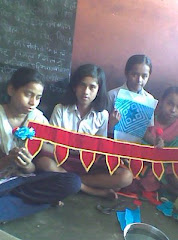The recent statements by two Samajwadi Party leaders, Mulayam Singh Yadav and Abu Azmi on rape are a direct slap on the face of the Indian women.
The Indian Constitution has given Indian women an equal status. But Mulayam declared on April 10, as India was getting ready to go to polls, that it was unfair to award death penalty to rapists for their 'mistake'. Mulayam, who has been chief minister of Uttar Pradesh and the defence minister of India, is the leader of Samajwadi Party that is currently ruling in the state. Speaking at a election rally in the town of Moradabad, he promised to bring about changes in the tough anti-rape law if his party comes to power in the 2014 general elections. Read the full story
here. It was his terming rape as ‘a mistake committed by boys’ that had women fuming.
Abu Azmi went a step further. He called for punishing a woman who is raped! He is reported to have said the following when a reporter asked him for a solution to the problem of rapes: "Solution is this: any woman if, whether married or unmarried, goes along with a man, with or without her consent, should be hanged. Both should be hanged. It shouldn't be allowed even if a woman goes by consent."
For more on Azmi's comment, click on the link. Later, after facing the ire of women’s organisations and some political parties, he retracted. By that time his son had come out with a statement citing a generation gap between senior members of the party and others who were of the view that a rapist deserved strict punishment. But that was a little too late. The message of what the leaders stand for had been made loud and clear.
When rape is termed a 'mistake' by boys and men, it completely negates the enormity of the crime that is known to scar a woman for life. At the same time, the blame is put squarely on the woman for the crime. Mulayam Singh Yadav epitomises this mindset that treats girls and women as second class citizens, as commodities and puts boys and men at a pedestal, worthy of special treatment.
With their utterances, Azmi and Mulayam join a chain of men in positions of power, whose statements keep the women subjugated and shackled in a society that is already heavily biased against the woman. In fact, these statements can be said to lead to greater violence against the female of the species, not just physical and mental, but that which stifles her very existence: rising number of female foetuses being aborted, neglect of the female child, poor literacy and education levels, poor participation in the organised workforce.
Statements like these negate the work of many individuals and organisations which have been trying very hard to bring about a change in the status of Indian women. When a common person finds a leader endorsing such a view, he is only emboldened, and once again the notion that a woman can be treated any way one wants, reverberates through the society.
The woman has traditionally been blamed for the violence on her. Rape has been used to keep women subjugated, ensuring that they do not step out of the many restrictions imposed on them: of dress, of behaviour, of their place in society, of being second to men. It was after decades of silence and inaction that the rape law was made stringent. It was a gang rape of horrific proportions in a bus moving on the roads of South Delhi, the most affluent of India’s neighbourhoods, that shook the nation and finally saw a lax law getting some teeth.
Before that, India had seen
some of the most inane judgments on rape. A former Chief Justice was q
uoted as stating that a victim should be allowed to marry the rapist, a throwback to some medieval practice. The Bombay High Court actually reduced punishment for a man convicted of sodomising a 10-month-old girl baby, accepting his contention that he lost control over himself as he was living away from his family!
Click here for the full story. Panchayats have let off rapists with punishments like five shoe smacks, and small fines, sending a message that rape is not a big crime.
And now, we have these statements by men from a party dominant and in power in one of the most backward states in the country: Uttar Pradesh. The state performs poorly on all social indicators like maternal mortality, child sex ratio, age at marriage, nutrition for women, life expectancy, education and workforce participation, and a rising crime graph.
It is important for women to feel secure in the knowledge that they matter, that any injustice done to them will be dealt with, that they are not second class citizens but enjoy the same status as men in the country, in society and in their families. Only then will there be progress.
--------
You might like to read an earlier article by me in The Tribune -




.jpg)




+(2).jpg)